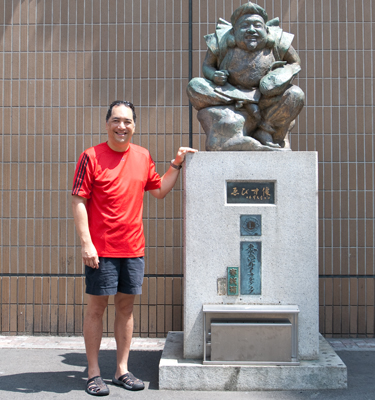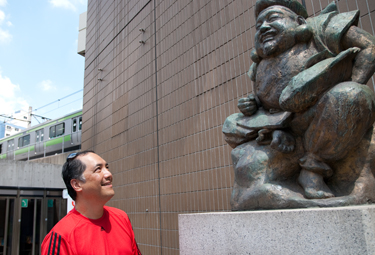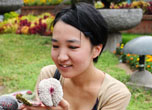
Posted: Mon Sep 13 2010
Zanuck Lindsey, guitarist
ZL: Hiya, what’s with this peculiar statue?
It’s a statue of Ebisu – one of the seven gods of fortune, said to have the power to increase profits and help businesses thrive. Is this your first time in Ebisu?
ZL: I use Ebisu as a transfer station. I just ran into an old friend from Hawaii here, Kamasami Kong – completely by coincidence. He was using his iPhone by the side of the road to record something for the radio. Tokyo’s full of people to meet – it’s a fascinating city.
Do you live in Tokyo?
ZL: I’m currently on tour with Exile. I’ve been playing guitar as a backing musician for them for a while now. I came to Tokyo in May, but since the tour’s almost over I’ll be heading back to Hawaii towards the end of September.
That must be a wonderful job. Have you got any interesting stories to tell about your time with Exile?
ZL: Quite a few! This is my second year playing with them as a backing musician, and we get on really well. Before coming back to Japan this year, I bought them each a pareo – a piece of cloth that’s traditionally worn in Hawaii wrapped around the waist. I gave everyone a pareo with a different colour and pattern, and taught them all how to wear it. Then, one day, they all appeared wearing their pareos and declared the day a ‘Hawaiian day’. However, one particular member hadn’t tied his pareo tight enough and it fell off. Everyone roared with laughter.
The band’s popularity is staggering. They’ve all made it while they’re young and they’re all so full of energy. Touring with them has been incredible.
What do you think of Japanese music?
ZL: I love it. I find enka to be both full of originality and touching. Plus I’m also really interested in Okinawan music – the unique timbre of the shamisen is wonderful. In fact, when I was in Japan last year, I bought a shamisen to take back to Hawaii with me. Although, what really gets me, even more than the music here, is the reaction from the fans who go to see it played live – Japanese fans seem to show an extraordinary level of respect for the musicians, which, in turn, acts to further the Japanese music scene. Americans love to define things; however, it’s impossible to really define exactly how a Japanese fan ‘feels about’ or ‘respects’ an artist here – I think it's a particular aspect of the culture that tends to be quite spiritual.
Had you ever been to Tokyo previously, before you began working with Exile?
ZL: The first time I came to Tokyo was in 1983. I worked as a musician at Tokyo Disneyland for two years. I used to direct their Hawaiian shows; however, since I also play other genres, such as rock and pop, I ended up performing in a number of different areas – such as Tomorrowland.
So you’ve had a connection to Japan for quite a while then…
ZL: Indeed. My mother is Japanese – her family name is Fujiwara – so I’ve felt a strong affinity with Japan for a long time. I think of it as kind of a second home.
Is there anything you particularly like about Japan?
ZL: The food. I’ve posted heaps of photos of Japanese food on Facebook; my Hawaiian friends just can’t seem to get their heads around the idea of eating mentaiko. I posted a picture of a pasta dish made with mentaiko and cream and received a bunch of comments along the lines of, ‘What on earth is that!?’ [Laughs]
Have your friends from Hawaii come to visit you in Japan?
ZL: They certainly have. We’ve had a relaxing time in Hakone together, and explored various places such as Shinjuku and Shibuya. It’s not hard to have a good time in Tokyo – when I’m not working I get up to all sorts of things, for example, attending live performances at Blue Note Tokyo. Last year I focused my efforts on learning more Japanese; however, this year I decided to focus more on experiencing new things and having fun. [Laughs] Before I head back to Hawaii in September, I’d like to try calligraphy and the tea ceremony.
More from Zanuck:

‘The winter in Tokyo is really cold – I’m not good with the cold. I walked two blocks and came down with a cold. How on earth do Japanese people manage to make it through the winter here?’
‘I’ll be back in Japan in November. I’m a member of a Hawaiian band named Kapala and plan to come back with the band.’
‘I think there’s a lot in common between the hospitality of the Hawaiians and that of the Japanese. For years my mother’s been telling me if I get married, I should marry a Japanese girl.’ [Laughs]
Tags:
Tweets
- About Us |
- Work for Time Out |
- Send us info |
- Advertising |
- Mobile edition |
- Terms & Conditions |
- Privacy policy |
- Contact Us
Copyright © 2014 Time Out Tokyo














Add your comment